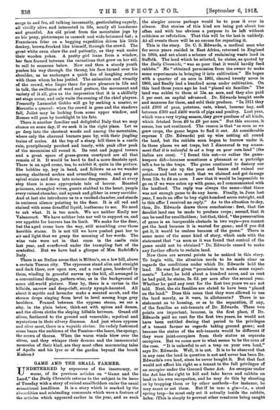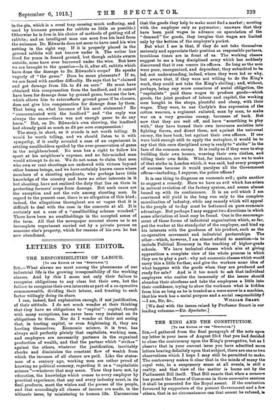GAME AND THE SMALL FARMER.
UNDETERRED by exposures of the inaccuracy, or worse, of its previous articles on " Game and the Land," the Daily Chronicle returns to the subject in its issue of Tuesday with a story of ruined smallholders under the usual sensational headlines. It is a story which is marked by the absurdities and misleading comments which were a feature of the articles which appeared earlier in the year, and as such
the simpler course perhaps would be to pass it over in silence. But stories of this kind are being put about too often and with too obvious a purpose to be left without criticism or refutation. That this will be the last is unlikely. At all events there will be no excuse for repeating it.
This is the story. Dr. C. S. Edwards, a medical man who for some years resided in East Africa, returned to England in 1904, and set about a scheme of reclaiming waste land in Suffolk. The land which he selected, he states, as quoted by the Daily Chronicle, " was so poor that it would hardly feed rabbits." He " obtained permission from the owner to make some experiments in bringing it into cultivation." He began with a quarter of an acre in 1905, cleared twenty acres in 1906, and finally had a hundred acres under cultivation. On this land three years ago he had " placed six families." The land was sublet to them at 15s. an acre, and they also paid 5 per cent. on capital advanced. Dr. Edwards bought seeds and manures for them, and sold their produce. "In 1911 they sold £800 of peas, potatoes, oats, wheat, lucerne hay, and between £300 and £400 worth of pigs and poultry. Last year, which was a very trying season, they grew produce of all kinds, which fetched from £6 to £8 per acre." But this success, it seems, has not continued. The reason is that " as soon as we grew crops, the game began to find it out. At considerable expense I (Dr. Edwards) put up wire netting all round the land, but the rabbits soon began to burrow under it. In these places we set traps, but I discovered to my amaze- ment that it is unlawful to set a trap on your own land" (the italics are ours). " I found this out—or rather the game- keepers did—because sometimes a pheasant or a partridge left a toe in the traps. The game continued to destroy our crops. They ate up the peas and beans and ruined our potatoes and beet so much that we claimed and got damage from 12s. to £4 an acre. I saw that it would be impossible to go on if we were eaten up with game, so I communicated with the landlord. The reply was always the same—that there was not enough game to do any harm. Finally, in June last year, I made an offer to buy eight hundred acres outright, and to this offer I received no reply." As to the situation to-day, then, Dr. Edwards draws three conclusions : first, that the derelict land can be made to produce crops ; second, that it can be used for smallholders ; but that, third, "the preservation of game is an insuperable obstacle in two ways—you cannot get the land because it is wanted for game; and if you did get it, it would be useless because of the game." There is some more of the same kind of story, which ends with the statement that " as soon as it was found that control of the game could not be obtained" Dr. Edwards ceased to make any further efforts to reclaim land.
Now there are several points to be noticed in this story. To begin with, the situation needs to be made clear as regards the conditions under which Dr. Edwards held the land. He was first given "permission to make some experi- ments." Later, he held about a hundred acres, and as rent he had paid, he states, 3s. 6d. per acre after the second year. Whether he paid any rent for the first two years we are not told. Next, the six families are stated to have been "placed on the land." Does this mean that they were allowed to use the land merely, as it were, in allotments ? There is no statement as to housing, or as to the separation, if any, of the families as sub-tenants of Dr. Edwards. These two points are important, because, in the first place, if Dr. Edwards paid no rent for the first two years, he would not have been entitled during that period to the privileges of a tenant farmer as regards taking ground game; and because the status of the sub-tenants would be different if they were joint-occupiers from their status as separate occupiers. But we come now to what seems to be the crux of the case. " It is unlawful to set a trap on your own land," says Dr. Edwards. Well, it is not. It is to be observed that in any case the land in question is not and never has been Dr. Edwards's own land, since he never bought it. But that fact would not affect his right as a tenant to the full privileges of an occupier under the Ground Game Act. An occupier under the Act has the right to kill and take hares and rabbits on land in his own occupation, and he may do this by shooting or by trapping them or by other methods—for instance, he may snare or net them. Butif he uses a gin—i.e., a steel spring trap—he must only set it actually inside the rabbits, holes. (This is simply to prevent other creatures being caught
in the gin, which is a cruel trap causing much suffering, and used by humane persons for rabbits as little as possible.) Otherwise he is free in his choice of methods of getting rid of rabbits ; and an intelligent man can soon free his land from the nuisance. Dr. Edwards does not seem to have used his wire netting in the right way. If it is properly placed in the ground rabbits will not burrow under it. The writer has lived for years in fenced ground, but though rabbits swarm outside, none have ever burrowed under the wire. But here we are brought to the question—Is it, after all, rabbits which have done the damage to Dr. Edwards's crops? He speaks vaguely of "the game." Does be mean pheasants ? If so, we are faced with another difficulty. He says that he " claimed and got damage from 12s. to R4 an acre." He must have obtained this compensation from the landlord, and it cannot have been for damage done by ground game, because the law, which allows him to exterminate ground game if he chooses, does not give him compensation for damage done by them. That being so, what becomes of his next statement ? He "communicated with the landlord" and "the reply was always the same—there was not enough game to do any harm." But, on Dr. Edwards's own showing, the landlord had already paid as much as £4 per acre compensation !
The story, in short, as it stands is not worth telling. It would be worth telling, and we should listen to it with sympathy, if it really revealed a case of an experiment in settling smallholders spoiled by the over-preservation of game in the neighbourhood. No man has a right to follow his sport at his neighbour's expense, and no fair-minded man would attempt to do so. We do not mean to claim that men who own or rent shootings are endowed with virtues beyond other human beings, and we have certainly known cases where members of a shooting syndicate, who perhaps have little knowledge of the country and have no other interests in it but shooting, have not realized the duty that lies on them in protecting farmers' crops from damage. But such cases are the exception and not the rule among shooting men. In regard to the present case, there is no allegation of this kind ; indeed, the allegations throughout are so vague that it is difficult to deal with the case in the concrete at all. It is certainly not a case of a "smallholding scheme wrecked." There have been no smallholdings in the accepted sense of the term. All that the newspaper account shows us is an incomplete experiment carried out by a private person on someone else's property, which for reasons of his own he has now abandoned.







































 Previous page
Previous page